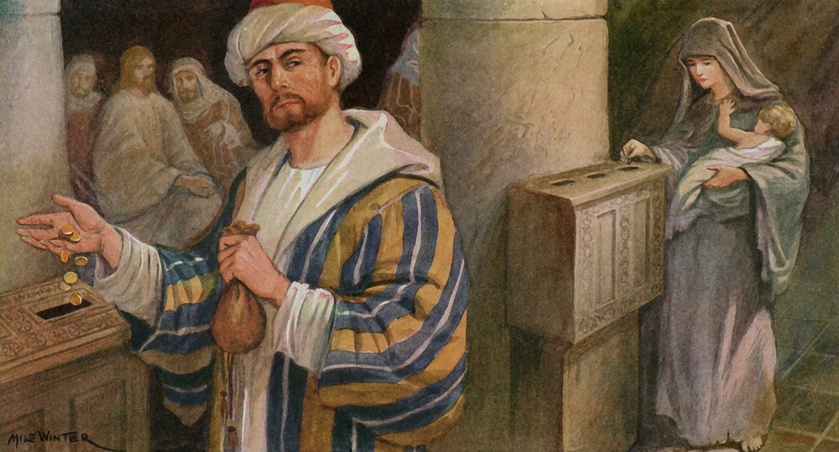Mary’s Mission: Jesus’ Words Spark the Spirit’s Epic Power
John 20:15-17
Jesus said to her, "Woman, why are you weeping? Whom are you seeking?" Supposing him to be the gardener, she said to him, "Sir, if you have carried him away, tell me where you have laid him, and I will take him away." Jesus said to her, "Mary." She turned and said to him in Aramaic, "Rabboni!" (which means Teacher). Jesus said to her, "Do not cling to me, for I have not yet ascended to the Father; but go to my brothers and say to them, ‘I am ascending to my Father and your Father, to my God and your God.’"
Jesus asked Mary this question in order to help her understand the situation. It's not that he didn't already know why she was upset, he simply wanted to ease her suffering and move her into her mission. Jesus’ questions invite us all to pause and reflect: What am I seeking? Where am I looking for hope? Like Mary, we may need to shift our gaze from our pain to the living Christ who is nearby. He knows her pain, yet He invites her to articulate it, to pause and reconsider her assumptions.
When Jesus says, "Mary," everything changes. In that single word, spoken with love and familiarity, Mary recognizes Him. This moment reminds us that Jesus knows us by name, and we know his voice.
He says to Mary, "Do not cling to me". It’s a pivotal moment that carries deep meaning for Mary and for us. This gentle instruction isn’t a rejection but a redirection, guiding Mary toward a new understanding of His presence and purpose. Mary’s instinct to cling to the tangible Jesus is natural. She’s just recognized her beloved Teacher, alive after the horror of His crucifixion. Her desire to hold on reflects her love and relief, but Jesus knows that clinging to His physical presence would keep her anchored to the past. He’s preparing her for a new reality, still teaching.
For us, "Do not cling to me" is a call to release our need to control or confine Jesus to our expectations. Are we holding onto old ideas of who Jesus is or how He should work in our lives? For us, "clinging" can manifest as trying to box Jesus into our preconceived notions or agendas. We may picture Jesus as a figure who fits neatly into our cultural, religious, or personal frameworks; perhaps a Jesus who only comforts, never challenges, or one who aligns with our priorities. We might demand that Jesus act in specific ways; solving problems on our timeline, granting certain outcomes, or conforming to our plans for our lives. This "clinging" reflects a desire for control, rooted in fear, familiarity, or misunderstanding.
Throughout Scripture, God calls His people to release their grip on the familiar and to embrace His greater purposes. God asked Abraham to leave his homeland and security for an unknown future. Jesus called the disciples to leave their fishing nets. Saul (The Apostle Paul) had to let go of his rigid understanding of God’s law in order to embrace Jesus as the risen Lord. In John 20, Mary’s encounter parallels these moments. Jesus’ instruction not to cling is not a rejection but an invitation to a deeper relationship and mission.
Her commission is rooted in her intimate recognition of Jesus. This is known as faith. She knows His voice, and He knows her by name, establishing a relationship that fuels her obedience. That is the definition of faith. Jesus is preparing her and the rest of His followers for His ascension and the coming of the Holy Spirit. Mary’s announcement bridges the resurrection and the new reality of Christ’s spiritual presence.
Jesus’ instruction to Mary is specific: "Go to my brothers and say to them, ‘I am ascending to my Father and your Father, to my God and your God.’" He is signaling the completion of His earthly mission and the beginning of a new phase where He will be glorified and present through the Spirit. And he is signifying the unity of The Spirit when he says, "my Father and your Father, to my God and your God."
His physical presence will soon give way to a spiritual presence, fulfilling His promise to be with His followers always (Matthew 28:20). Jesus’ earthly mission has paved the way for the next chapter of God’s redemptive plan, where His followers will carry forward the gospel empowered by the Holy Spirit. Jesus is walking in the Spirit with us, not limited by time or space, allowing Him to be with all His followers simultaneously.
The Spirit’s arrival at Pentecost (Acts 2:1-4) will equip the disciples to continue Jesus’ mission, spreading the gospel to all nations. The Holy Spirit, sent after Jesus’ ascension, will unite believers with God and each other. A reality where God is not a distant deity but our Father and our God.
Jeremiah 31:33
"I will be their God, and they shall be my people"
Jesus’ resurrection fulfills this promise, extending it to all who believe, Jew and Gentile alike.
Ephesians 2:18
"For through him we both have access in one Spirit to the Father."
The Spirit makes God’s Fatherhood a lived reality for believers, guiding them into truth and empowering their witness.
Reflection:
Meditate on what it means that God is "your Father" and "your God." How does this shape your identity and relationship with Him?
In John 20:17, the Holy Spirit is the unseen but essential agent who will bring Jesus’ words to fruition, making God’s Fatherhood a lived reality and uniting believers in their mission. The Holy Spirit enables the disciples to proclaim the gospel in diverse languages, fulfilling Jesus’ promise that they would be His witnesses "to the ends of the earth" (Acts 1:8). The Spirit gives courage, clarity, and conviction to share the message today through our words, actions, or prayers, giving us boldness to testify to Jesus’ life and love. The Spirit calls us to live in harmony with other believers, overcoming divisions and reflecting God’s love to the world. And the Spirit’s role is to glorify Jesus and reveal His truth, helping us know Jesus more deeply, guiding us into that truth through Scripture, prayer, and worship.
As a woman in a patriarchal culture, Mary’s spiritual commission at the tomb shows that the Spirit’s empowerment transcends social barriers, equipping all believers for Christ's mission. The Spirit equips us to continue Mary’s mission, proclaiming Jesus’ resurrection and the hope of knowing God as our Father. This intimacy fuels our faith and prayer life, anchoring us in God’s love.
Today believers are called to trust the Spirit’s presence and power, and step boldly into the mission He has prepared for them, knowing that they are never alone. Reflect on Galatians 5:22-23 and ask the Spirit to grow these qualities in you, making your life a testimony to Jesus.
And pray:
Holy Spirit, thank You for dwelling in me and making God my Father. Empower me, like Mary, to proclaim Jesus’ life and love with courage. Unite me with my brothers and sisters in Christ, and guide me into all truth. Transform my heart to reflect Your fruit and use me to share Your hope with the world.
In the name of the Father, Son, and Holy Spirit, Amen.




















